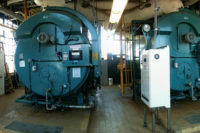Mount Royal University (MRU) in Calgary, Alberta, Canada, has a full-time student population of more than 10,000. Founded in 1910, the university moved to its current 118-acre suburban campus in 1970.
Like many educational institutions, Mount Royal University is committed to reducing its carbon footprint and operating in an environmentally responsible way. One of the long-term goals of the university’s corporate energy management program is to reduce energy consumption on campus.
In 2015, Owen Zarazun, director of facilities operation at Mount Royal University, asked Calgary-based Tundra Equipment for recommendations about retrofitting the two 800-hp Cleaver-Brooks steam boilers that had been operating for 35 years.
“We already had a good investment in the Cleaver-Brooks steam boilers,” said Zarazun. “They are quality boilers in great condition for their age. It did not make sense to demolish good products. Rather, we wanted to modernize the plant along with auxiliary systems.”
Aleksei Myroniuk, technical sales representative for Tundra, agreed that the two boiler pressure vessels at Mount Royal University were in good shape, which made retrofitting an option.
Tundra then presented a plan to MRU, showing how retrofitting the plant’s two boilers would help to increase efficiency and reliability while also bringing the units into compliance with the local gas code. In addition, the plan recommended modernizing the controls and integrating the equipment into the plant’s BMS.
In addition to retrofitting the boilers, MRU wanted to upgrade its plant, so it consulted with Canadian consulting engineering firm Smith + Anderson. Regan Moffat, principal of Smith + Anderson’s Calgary office, proposed a plan that included recommendations such as heat exchanger and pump replacements.
“Our project cost was less than what it would have been to do a boiler replacement with a similar end result. There was also a quicker turnaround, so we realized the savings sooner,” said Zarazun.
Construction began in the summer of 2016 and was completed in several phases throughout a six-month period. Final commissioning was in January 2017.
“As with any retrofit project, there are always challenges,” commented Moffat. “At the end of the day, Tundra and Cleaver-Brooks worked with Mount Royal to overcome them, and the client is happy. They met their main goals of increasing plant efficiency, increasing reliability, and having more control options.”
During the retrofit process, the university did not have to displace or relocate any staff, students, or programs.
“No one on campus had a clue that we were doing this project, as there were zero service interruptions,” said Zarazun. “This is key when working on any centralized system.”
Facility personnel really like the functionality of the Hawk 4000 control, especially the fact that it ties into the plant’s central BMS. The control provides plant management more information and better controllability.
Zarazun estimates that the retrofit has increased boiler efficiency by more than 10 percent, and upgrades to the central steam plant have increased its efficiency by as much as 30 percent. As a result, MRU’s operating costs decreased by $385,885 the first year of operation. At the same time, the upgrades renewed critical infrastructure at the university.
“Our project cost was less than what it would have been to do a boiler replacement with a similar end result,” said Zarazun. “There was also a quicker turnaround, so we realized the savings sooner.”
The project also met Mount Royal University’s goal of minimizing its impact on the environment. The plant and boiler upgrades reduced the university’s greenhouse gas emissions by 1,895 tons of carbon dioxide equivalents. These reductions correspond to 406 cars not being driven for a year, 205 homes not using energy for a year, and 2,232 acres of forest preserved from deforestation.



